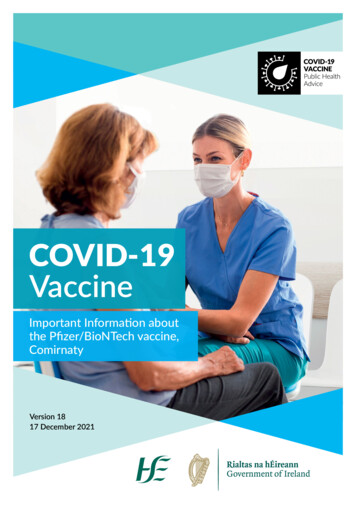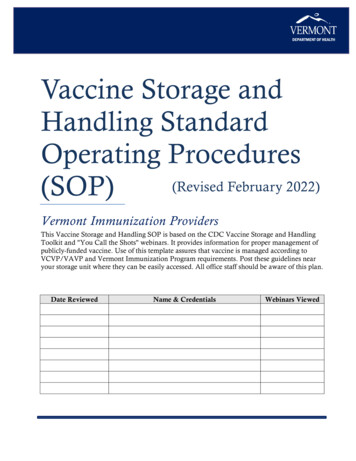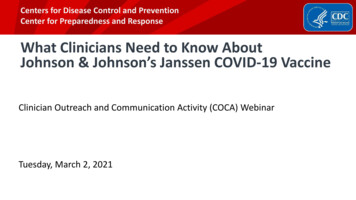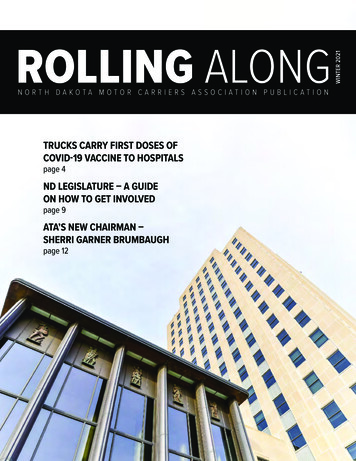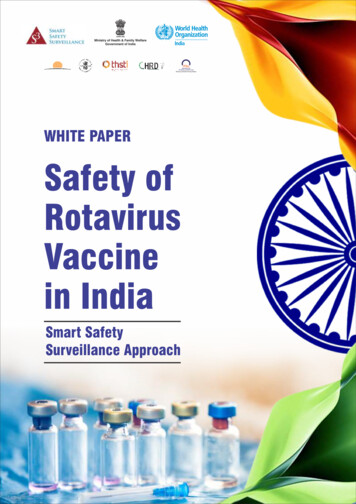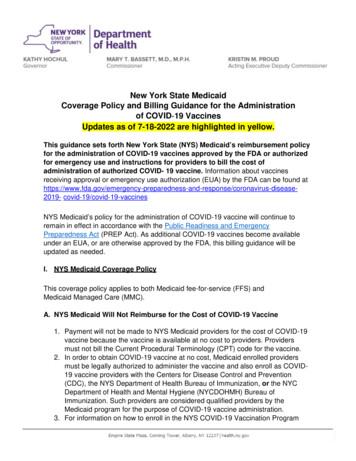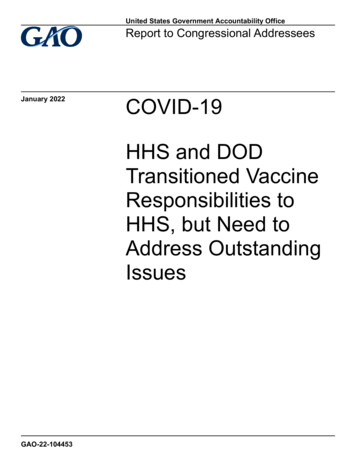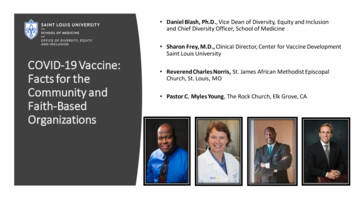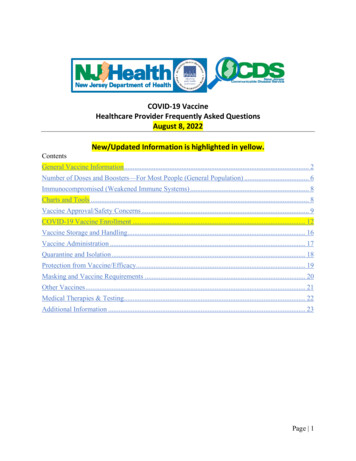
Transcription
COVID-19 VaccineHealthcare Provider Frequently Asked QuestionsAugust 8, 2022ContentsNew/Updated Information is highlighted in yellow.General Vaccine Information. 2Number of Doses and Boosters—For Most People (General Population) . 6Immunocompromised (Weakened Immune Systems) . 8Charts and Tools . 8Vaccine Approval/Safety Concerns . 9COVID-19 Vaccine Enrollment . 12Vaccine Storage and Handling. 16Vaccine Administration . 17Quarantine and Isolation . 18Protection from Vaccine/Efficacy. 19Masking and Vaccine Requirements . 20Other Vaccines . 21Medical Therapies & Testing. 22Additional Information . 23Page 1
General Vaccine InformationIs a COVID-19 vaccine necessary?COVID-19 can be a minor illness in some or lead to severe disease or even death in previouslyhealthy people. This means, everyone should take the virus seriously — if not for themselves,then for those around them.Many treatments and medications are being studied, but there is no cure. Prevention is key.Vaccination is an important step in helping to prevent this illness and its potentially devastatingconsequences.What vaccines are approved or authorized for use?The following are the COVID-19 vaccines available in the United States: Pfizer-BioNTech/Comirnaty Moderna/Spikevax Johnson & Johnson’s Janssen NovavaxFor current information on the types and use of COVID-19 vaccines available, please l-considerations/covid-19-vaccines-us.htmlor click on the “Interim Clinical Considerations for Use of COVID-19 Vaccines” on the left sideof the COVID-19 ovid2019 vaccination.shtmlWhat is Pfizer-BioNTech/Comirnaty?On July 8, the FDA licensed Pfizer-BioNTech’s COVID-19 vaccine for the prevention of COVID19 in individuals ages 12 through 15 years. The expansion of the license means that theemergency use authorization for use of this vaccine in this age group no longer applies.Once vaccines are approved by the FDA, companies can market the vaccines under brandnames. COMIRNATY is the brand name for the Pfizer-BioNTech COVID-19 vaccine. After FDAapproval, the FDA-authorized Pfizer-BioNTech COVID-19 vaccine for individuals ages 12 yearsand older can now be marketed as COMIRNATY. No change was made to the vaccine’s formulawith the name change.The Pfizer-BioNTech vaccine label remains for use in authorized age groups (6 months through11 years).What is Moderna/Spikevax?Moderna/Spikevax COVID-19 vaccine was licensed/approved by the U.S. Food and DrugAdministration (FDA) on January 31,2022, for individuals ages 18 years and older. Once vaccinesare approved by the FDA, companies can market the vaccines under brand names. Spikevax isthe brand name for the Moderna COVID-19 vaccine. The FDA-authorized Moderna COVID-19Page 2
vaccine for individuals ages 18 years and older will now be marketed as Spikevax. No changehas been made to the vaccine’s formula with the name change.The Moderna vaccine label remains for use in authorized age groups (6 months through 17years).What is Novavax vaccine?The CDC recently accepted the Novavax vaccine for emergency use authorization for adults 18years and older. Novavax is a two-dose, protein-based COVID-19 vaccine that is currently beingused in more than 40 countries and has been authorized by the European Union and the WorldHealth Organization.Novavax will now be the fourth COVID-19 vaccine available in the U.S., in addition to Pfizer,Moderna, and Johnson & Johnson. As a protein-based vaccine, Novavax is another option forpeople who are allergic to one of the components in a mRNA or viral-vector vaccine. Thevaccine is currently authorized as a primary series only, and not as a booster dose.Regulators authorized the vaccine following an extensive review of clinical trials and safety andeffectiveness data.How is Novavax different from the other COVID-19 vaccines?The Novavax vaccine is created using more traditional protein-based technology for vaccinedevelopment, unlike the other vaccines currently available in the United States (the Pfizer andModerna mRNA vaccines and viral-vector Johnson & Johnson vaccine).The Novavax vaccine uses a combination of purified coronavirus spike proteins and an immuneboosting stimulant called an adjuvant (common in many vaccines) to strengthen the body’simmune response against COVID-19. Vaccines using protein subunits have been used for morethan 30 years in the United States, beginning with the first licensed hepatitis B vaccine. Otherprotein subunit vaccines used in the United States today include those to protect againstinfluenza and whooping cough (acellular pertussis). For more information on how Novavax andother COVID-19 vaccines work, visit different-vaccines/how-they-work.html.Can children six months and older receive the COVID-19 vaccine?Yes. COVID-19 vaccines are now recommended for everyone 6 months and older and boostersfor everyone 5 years and older, if eligible. The FDA authorized a three-dose primary series ofPfizer vaccine for children 6 months through 4 years of age and a two-dose primary series ofModerna vaccine for children 6 months through 5 years of age.On June 23, 2022, the CDC also recommended the use of Moderna vaccine for ages 6 through17 years.Parents are encouraged to schedule an appointment to get their child vaccinated!Page 3
Are the COVID-19 vaccines given to children the same as the vaccines given to adults?The COVID-19 vaccines for children have the same active ingredients as the vaccines given toadults. However, some children receive a smaller, age-appropriate dose that is the right size forthem. The smaller doses were rigorously tested and found to create the needed immuneresponse for each age group. Your child should get the vaccine made for their age group.For vaccine product presentations (age of use, storage and handling, cap color), please ds/summary-interim-clinicalconsiderations.pdf.Why should children receive the COVID-19 vaccine? Just like adults, children can become severely ill from COVID-19, be hospitalized, andeven die. Children can experience short- and long-term health complications that canaffect their mental and physical health and quality of life. There is no way to predict if a child will develop a severe or mild case of COVID-19. Evenhealthy children without underlying medical conditions can get severe COVID-19 orsuffer from long-term health complications. Vaccinating this younger age group helps lessen the strain on families by providinggreater confidence with children participating in childcare, school, and other activities. COVID-19 vaccination reduces the strain on the healthcare system. Children who have previously had COVID-19 should still get vaccinated, as vaccinationoffers added protection.Parents/guardians can get their children vaccinated by calling their healthcare provider to makean appointment, visiting covid19.nj.gov/finder, or contacting the COVID-19 Vaccine Call Centerat 855-568-0545 (10a-6p, M-F; 10a-4p, Sa).For more information about COVID-19 vaccines and children consider sharing the followinginformation with your ts/topics/NCOV/protect child covid19 vax.pdf.How can I get vaccinated?There are multiple ways to get an appointment including:1. Use the NJ Vaccine Appointment Finder to find vaccination locations near you withavailable appointments.2. Attend a pop-up or mobile vaccination event in your community.3. Register with the NJ Vaccine Scheduling System to be notified when an appointment isavailable to you at vaccine locations that use the State's Vaccine Scheduling System. Ifyou need assistance registering with the NJVSS, please call 855-568-0545.4. Seniors 65 can call the senior-specific hotline at 855-429-1168 to schedule dedicatedvaccine appointmentsPage 4
5. Veterans, their spouses, and their caregivers may be eligible for vaccines through theVA. Learn more here.Note: Please verify requirements with a vaccination site before visiting or making anappointment. Some require proof of residency within a specific county or municipality. Inaddition, minors must have the consent of a parent or legal guardian to be vaccinated.I have some patients who are homebound. Will they be able to receive the COVID-19vaccine?A person who is homebound or their healthcare provider/caregiver may request an in-homevaccination appointment by completing a form at covid19.nj.gov/homeboundvax (English)or covid19.nj.gov/homeboundvax-es (Spanish).For assistance completing the form by phone, please call the NJ COVID-19 Vaccine Call Centerat 1-855-568-0545.Can you tell me more about the NJVSS? Is my information private?The NJVSS is a secure online website developed by the NJ Department of Health for publichealth purposes. The NJVSS is a system that allows you to sign-up to make a COVID-19 vaccineappointment.You will be asked to provide personal information (name, address, gender, race, and email),medical screening and occupation information. This helps to determine your eligibility for thevaccine . NJVSS will send you e-mail reminders about your appointment and reminders aboutgetting the 2nd dose. The NJVSS also lets you make an appointment at a vaccination locationmost convenient for you.The information collected on the NJVSS is used for public health purposes only AND to ensurethat same person returns for the 2nd dose of the same vaccine. For more information, visithttps://covid19.nj.gov/pages/vaccine and https://covidvaccine.nj.gov/.Some of my patients used the NJVSS to receive the vaccine at my facility. Who do I contactfor technical assistance with using NJVSS?Providers should email NJVaxReporting@doh.nj.gov for any issues or questions relating toNJVSS.I have patients who lost their COVID-19 vaccination card or need additional proof ofvaccination. What advice can you give them?Patients may be able to get another copy of their COVID-19 vaccine card at the site where theywere vaccinated; however, not all sites provide this service and some locations have closed.Alternatively, you can print your patient’s official immunization record for them. Please includethe COVID-19 vaccine lot number for the patient. The official record will list all vaccines thatyour patient has received and the dates of administration.Page 5
Another option is for individuals to download the Docket mobile app (COVID-19 vaccines only)or submit a request to NJIIS. For specific instructions, uestImmunizationRecord.Where can my patients find information on public transportation to vaccine locations?Through the Department’s VAXRIDE initiative, NJ TRANSIT supports New Jerseyans in theirefforts to get vaccinated against COVID-19. Visit https://www.njtransit.com/vaxride to findvaccination sites that are conveniently served by NJ TRANSIT bus, train and light rail routes.In addition, NJ 211 is offering free rides to and from vaccination sites in partnership with UnitedWay Worldwide and Lyft. Rides are available wherever Lyft operates in New Jersey and isavailable to everyone including those with collapsible wheelchairs and walkers. To request afree ride, call 211 or text 898-211, or visit 211 to learn more.Number of Doses and Boosters—For Most People (General Population)Where can I find information on the spacing between doses and other specific details?For a quick reference, please see the CDC COVID-19 vaccine chart available here and on thestate Health Department’s COVID-19 vaccine ovid2019 vaccination.shtml.Has the spacing between the two-dose primary series of Pfizer-BioNTech and Modernachanged?CDC is providing healthcare providers with additional information to factor into COVID-19vaccine recommendations for their patients. Some people ages 12 through 64 years—andespecially males ages 12 through 39 years—may benefit from getting their second mRNACOVID-19 vaccine dose 8 weeks after receiving their first dose, instead of after the FDAapproved or FDA-authorized 3 weeks (Pfizer-BioNTech) or 4 weeks (Moderna).Recent safety and effectiveness data illustrate that a longer time interval between the first andsecond mRNA COVID-19 vaccine dose gives the body a chance to build a stronger immuneresponse, increasing the effectiveness of these vaccines, and offering individuals greaterprotection against COVID-19. A longer interval between primary doses can also help lower therare risk of myocarditis and pericarditis following vaccination. Although rare, some cases havebeen reported—mostly among adolescent and young adult males—after receiving the PfizerBioNTech or Moderna vaccines.For whom might the FDA-approved or FDA-authorized 3- or 4-week intervals between 1st and2nd doses of mRNA COVID-19 vaccines continue to be optimal?Vaccine providers should continue to recommend the 3- or 4-week interval for patients who areat higher risk of having an inadequate response to the first mRNA vaccine dose (such as peoplewho are moderately or severely immunocompromised), patients who are at higher risk forsevere complications of COVID-19 (such as adults ages 65 years and older), and patients whoneed rapid protection, such as during high levels of community transmission. Providers can helpPage 6
patients determine the best interval between vaccine doses by examining their balance ofbenefits and risks. For more information, visit s.For a quick reference, please see the CDC COVID-19 vaccine chart available here and on theCOVID-19 vaccine ovid2019 vaccination.shtml.Who should receive a first booster dose?Everyone ages 5 and older is recommended to receive a booster dose. For those 18 and older,any of the COVID-19 vaccines can be used for the booster dose, but Pfizer-BioNTech orModerna is preferred. You may get Johnson & Johnson’s Janssen COVID-19 vaccine in somesituations.The timing of the booster dose is based on the vaccine you originally received: Pfizer-BioNTech—at least 5 months after the last Pfizer-BioNTech primary series Moderna—at least 5 months after the Moderna primary series J&J—at least 2 months after the first dose of J&J vaccine.What booster dose can those ages 5-17 receive?Those ages 5-17 can receive a Pfizer-BioNTech COVID-19 vaccine booster at least 5 monthsafter their last dose. Pfizer-BioNTech is the only vaccine approved for this age group. Thosewho are 18 years and older can choose which COVID-19 vaccine they want for the boosterdose, but Pfizer-BioNTech or Moderna is preferred. You may get Johnson & Johnson’s JanssenCOVID-19 vaccine in some situations. Talk with your doctor to learn more.Who should get a second booster?The CDC recommends an additional booster dose for certain individuals: People ages 50 and older are recommended to get a second booster dose of an mRNAvaccine (Pfizer-BioNTech or Moderna) at least 4 months after receiving the first boosterdose. People ages 12 and older who are severely immunocompromised are recommended toget a second booster dose with an mRNA vaccine (Pfizer-BioNTech or Moderna) at least4 months after the first booster dose. People ages 18-49 who received the J&J vaccine as a primary series and the J&J boostermay receive get a second booster with one of the mRNA vaccines (Pfizer-BioNTech orModerna) at least 4 months after the first booster dose.These recommendations acknowledge the increased risk of severe disease in certainpopulations including those who are elderly or over the age of 50 with multiple underlyingconditions, along with the currently available data on vaccine and booster effectiveness.Page 7
Immunocompromised (Weakened Immune Systems)Do some people need an additional dose?Yes, people with weakened immune systems are recommended to receive an additional doseof an mRNA (Pfizer-BioNTech or Moderna) 28 days after completing the primary series[(starting dose(s)].This third dose is sometimes referred to as part of the primary series forthose who are moderately or severely immunocompromised.Please see page 2 of the CDC COVID-19 vaccine chart available here and on the COVID-19vaccine website, https://www.state.nj.us/health/cd/topics/covid2019 vaccination.shtml.Do people who received an additional (3rd) dose also need a booster dose?Yes, people 5 years and older with weakened immune systems are recommended to receive anadditional dose of an mRNA (Pfizer-BioNTech or Moderna) vaccine plus a booster dose. Thetiming between the additional dose and the booster depends on the vaccine you received foryour primary series: If you received Pfizer-BioNTech or Moderna two-dose primary series: Booster dose isrecommended at least 3 months after the additional dose for a total of four doses. If you received a Johnson & Johnson (J&J)/Janssen one-dose primary series: Boosterdose is recommended at least 2 months after the additional dose for a total of threedoses.Do immunocompromised people need a second booster dose?Yes, the CDC recommends people ages 12 and older who are severely immunocompromised toreceive a second booster dose with an mRNA vaccine (Pfizer-BioNTech or Moderna) at least 4months after the first booster dose.This recommendation is based on the increased risk of severe disease in certain populationsalong with the currently available data on vaccine and booster effectiveness.Charts and Tools CDC Recommended COVID-19 vaccine schedulesCDC When Do I Need a Booster Dose ToolIsolation and Quarantine CalculatorSummary Document for Interim Clinical ConsiderationsInterim COVID-19 Immunization Schedule for 6 Months of Age and OlderPage 8
Vaccine Approval/Safety ConcernsWhat are the side effects of COVID-19 vaccine?Side effects to the COVID-19 vaccines are typically mild and usually go away in one to two days— like soreness in the arm, fatigue, headaches, or a slight fever.Some people may have no side effects.The risk of having a serious reaction to the COVID-19 vaccine is very low.Rare cases of myocarditis (inflammation of the heart muscle) and pericarditis (inflammation ofthe outer lining of the heart) have been reported. New studies have shown the rare risk ofmyocarditis and pericarditis associated with mRNA COVID-19 vaccination—mostly among malesbetween the ages of 12 and 39 years—may be further reduced with a longer time between thefirst and second dose.Getting the COVID-19 vaccine is much safer than getting sick with COVID-19 illness.For more information, visit /safety.html.Is there a preference for the Pfizer-BioNTech and Moderna vaccines rather than the J&J?Yes, the CDC is now recommending that people get a Pfizer-BioNTech or Moderna COVID-19vaccine over the J&J vaccine. This recommendation was based on the latest scientific evidenceon vaccine effectiveness, vaccine safety, and considerations of the U.S. supply. Specifically, newdata showed a very small, but increased risk for a rare blood clot disorder for those whoreceived the J&J vaccine.The FDA and CDC take vaccine safety very seriously, which is why all vaccines are closelymonitored. Identification of any possible risks, like the low risks associated with the J&J vaccine,is a sign that the nation’s safety monitoring system for COVID-19 vaccines is working.Can people still get the J&J vaccine?People who are not yet vaccinated, along with those who received the J&J vaccine and are noweligible for a booster shot, should get a Pfizer-BioNTech or Moderna vaccine. These twovaccines are widely available, but J&J vaccines are still on the market for people who areunwilling or unable to get a Pfizer-BioNTech or Moderna vaccine.What is the difference between emergency use authorization and full approval?In an emergency when lives are at risk, like a pandemic, it may not be possible to have all theevidence that the FDA would usually have before approving a vaccine or drug. If there’sevidence that strongly suggests that patients have benefited from a treatment, the agency canissue an EUA to make it available. For the COVID-19 vaccines, FDA required two months ofsafety and efficacy data before the EUA was granted. That included clinical trials with tens ofthousands of people and rigorous testing and review, and all the vaccines continue to be closelymonitored. Compared to emergency use authorization, FDA approval of vaccines requires evenPage 9
more data on safety, manufacturing, and effectiveness over longer periods of time and includesreal-world data.Is there a package insert or Vaccine Information Statement (VIS) along with an EUA?When FDA authorizes emergency use of a medical product such as an anticipated COVID-19vaccine, an EUA Fact Sheet for Healthcare Providers (in place of a package insert typical of alicensed vaccine) and an EUA Fact Sheet for Recipients (akin to product information forpatients or a CDC-provided VIS for a licensed vaccine) must be provided to the healthcareproviders prescribing and/or administering the authorized medical product. The healthcareproviders, in turn, provide the EUA Fact Sheet for Recipients to vaccine recipients or theirguardians. These fact sheets are available at ccines.What is the difference between the EUA Fact Sheet for Recipients and the VaccineInformation Statement (VIS)?When FDA authorizes a vaccine for use under an EUA, providers and public health entitiesinvolved in vaccine administration are legally required to provide the FDA-authorized EUAFact Sheet for Recipients to individuals receiving vaccine or their guardians, similar to VIS’sthat are also required by law for certain licensed vaccines. The EUA Fact Sheet for Recipients,like the VIS, explains the benefits and risks associated with the vaccine. But unlike a VIS, theEUA fact sheet also provides vaccine product-specific information, including the vaccine’sauthorized use, dose/dose-series, and known information or experience with the vaccinefrom clinical trials that support issuance of the EUA by FDA.Providers can provide the EUA Fact Sheet for Recipients (or VIS if/when the COVID-19 vaccineis licensed) in a variety of ways, including hard copy, online, video, or other electronic meansof dissemination.What are Emergency Use Instructions (EUI)?EUI allows certain uses of FDA-approved medical products that are needed during public healthemergencies without the FDA needing to issue an EUA. CDC issued EUI for use of the COVID-19vaccine by Pfizer-BioNTech and Moderna for primary, additional, and/or booster doses incertain individuals. The EUI are necessary because these uses extend beyond their FDAapproved labeling.It is strongly suggested that providers provide EUI prior to vaccine administrationFor additional information and to download the most current tructionseui#EmergencyUseInstructionsPage 10
What safety monitoring is in place for these vaccines?For COVID-19 vaccines, CDC and federal partners will use a toolbox of existing and newmonitoring systems for COVID-19 vaccine safety. CDC will rely on existing systems that monitor the safety of vaccines every day, theVaccine Adverse Event Reporting System (VAERS), the Vaccine Safety Datalink (VSD),and the Clinical Immunization Safety Assessment (CISA) Project.CDC has also developed a new, voluntary smartphone-based tool, v-safe, that uses textmessaging and web surveys to provide personalized health check-ins after patientsreceive a COVID-19 vaccination.CDC has also expanded its collaboration with the Advisory Committee on ImmunizationPractices (ACIP) to include a special ACIP COVID-19 Vaccine Safety Technical Sub-Groupto review available vaccine safety data.For more information, please visit safety.html.What is the difference between VAERS and V-safe?VAERS is the reporting mechanism for any adverse events. Specifically related to COVID-19vaccination, providers will be required to report: Vaccine administration errors (whether associated with an adverse event or not) Serious adverse events Multisystem inflammatory syndrome Cases of COVID-19 that result in hospitalization or death after the recipient hasreceived COVID-19 vaccineAnyone can submit a report to VAERS, including patients, family members, healthcareproviders, vaccine manufacturers and the general public. VAERS cannot determine if a vaccinecaused an adverse event, but can determine if further investigation is needed. Additionalinformation is available at the VAERS website, https://vaers.hhs.gov/index.html.V-safe is an optional smartphone-based tool that anyone who has received a vaccination canregister for. At the time of vaccination, everyone receiving a vaccine will be given informationabout signing up for v-safe. Anyone reporting a clinically important event during any v-safehealth check will receive a phone call from the VAERS (Vaccine Adverse Event ReportingSystem) hotline, and if applicable, a VAERS report will be taken during that call. V-safe also willcollect information on pregnancy status and enables follow-up on pregnant women.For more information, please visit safety/faq.html.Will the COVID-19 vaccine affect the menstrual cycle (period)?Results from recent research studies show that people who menstruate may observe small,temporary changes in menstruation after COVID-19 vaccination, including: Longer duration of menstrual periods Shorter intervals between periodsPage 11
Heavier bleeding than usualDespite these temporary changes in menstruation, there is no evidence that COVID-19 vaccinescause fertility problems. Should people who are pregnant or breastfeeding receive the COVID-19 vaccine?Yes! COVID-19 vaccination is recommended for people who are pregnant, breastfeeding, tryingto get pregnant now, or might become pregnant in the future. Pregnant and recently pregnantpeople are more likely to get severely ill with COVID-19 compared with non-pregnant people.Getting a COVID-19 vaccine can protect against severe illness from COVID-19. For moreinformation, visit y-fertility.For more information about COVID-19 vaccine and common myths, cines/facts.htmlWhat are the contraindications for (reasons for not receiving) COVID-19 vaccination?A severe allergic reaction (e.g., anaphylaxis) to a previous dose or component of the vaccine is acontraindication for receiving any of the COVID-19 vaccines.People with an immediate allergic reaction to the first dose of an mRNA COVID-19 vaccineshould not receive additional doses of either of the mRNA COVID-19 vaccines. CDC has provideda chart to assist in the evaluation of immediate reactions to VID-19 Vaccine EnrollmentHow can I become a COVID-19 provider?The New Jersey Department of Health (NJDOH) began accepting new COVID-19 VaccinationProgram Provider Agreement applications through NJIIS on Tuesday, June 1, 2021. Please FacilityEnrollment for specific information onjoining the COVID-19 vaccination program.I heard vaccines have to be entered into NJIIS? What is NJIIS?The New Jersey Immunization Information System (NJIIS), operating since 1997, is thestatewide immunization information system (IIS) serving as the official repository ofimmunizations administered to individuals in the state of New Jersey. NJIIS is a free,confidential, population-based online system that collects and consolidates immunizationinformation to provide an accurate immunization assessment for individuals in the state of NewJersey, as well as assists communities in assessing their immunization coverage and identifyingpockets of need. For more information on NJIIS, please e.Page 12
Why do I need to register with NJIIS?In order to receive and administer COVID-19 vaccines, you will be required to register with NJIISby completing the NJIIS COVID-19 F
Moderna mRNA vaccines and viral-vector Johnson & Johnson vaccine). The Novavax vaccine uses a combination of purified coronavirus spike proteins and an immune-boosting stimulant called an adjuvant (common in many vaccines) to strengthen the body's . immune response against COVID-19. Vaccines using protein subunits have been used for more
